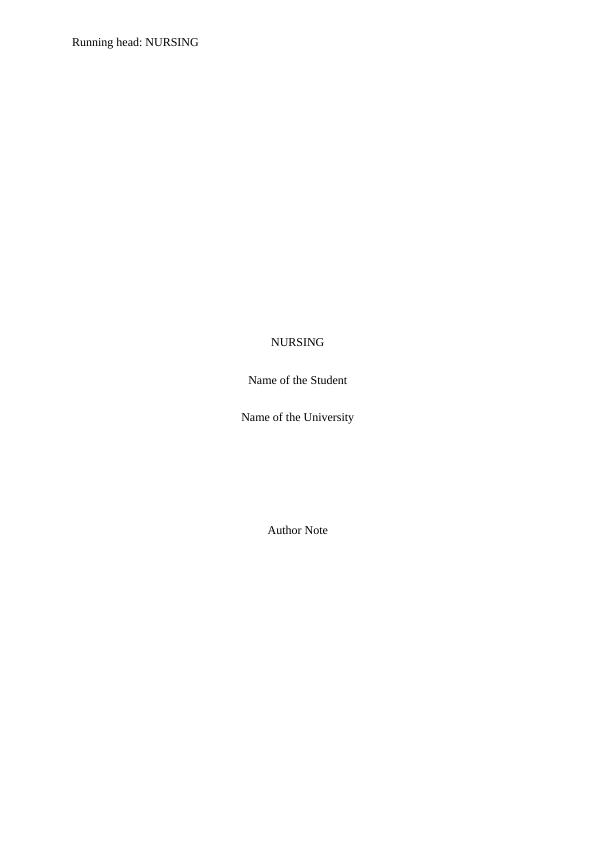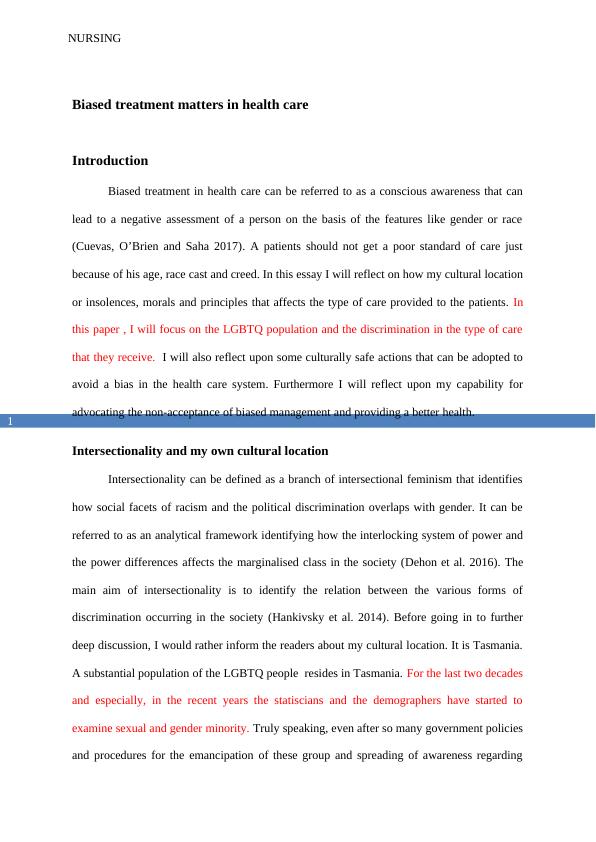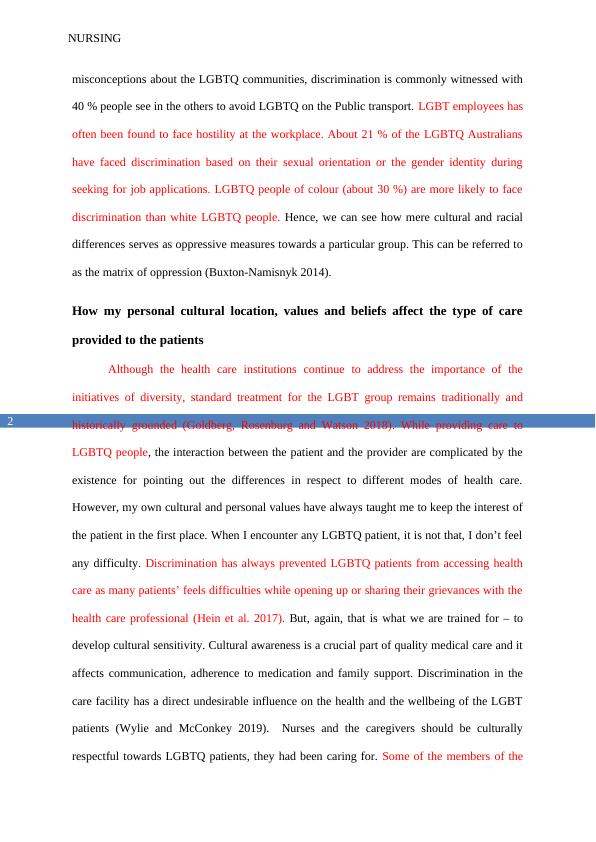Nursing: Biased Treatment Matters in Health Care Assessment 2022
Added on 2022-10-02
8 Pages2112 Words22 Views
Running head: NURSING
NURSING
Name of the Student
Name of the University
Author Note
NURSING
Name of the Student
Name of the University
Author Note

NURSING
1
Biased treatment matters in health care
Introduction
Biased treatment in health care can be referred to as a conscious awareness that can
lead to a negative assessment of a person on the basis of the features like gender or race
(Cuevas, O’Brien and Saha 2017). A patients should not get a poor standard of care just
because of his age, race cast and creed. In this essay I will reflect on how my cultural location
or insolences, morals and principles that affects the type of care provided to the patients. In
this paper , I will focus on the LGBTQ population and the discrimination in the type of care
that they receive. I will also reflect upon some culturally safe actions that can be adopted to
avoid a bias in the health care system. Furthermore I will reflect upon my capability for
advocating the non-acceptance of biased management and providing a better health.
Intersectionality and my own cultural location
Intersectionality can be defined as a branch of intersectional feminism that identifies
how social facets of racism and the political discrimination overlaps with gender. It can be
referred to as an analytical framework identifying how the interlocking system of power and
the power differences affects the marginalised class in the society (Dehon et al. 2016). The
main aim of intersectionality is to identify the relation between the various forms of
discrimination occurring in the society (Hankivsky et al. 2014). Before going in to further
deep discussion, I would rather inform the readers about my cultural location. It is Tasmania.
A substantial population of the LGBTQ people resides in Tasmania. For the last two decades
and especially, in the recent years the statiscians and the demographers have started to
examine sexual and gender minority. Truly speaking, even after so many government policies
and procedures for the emancipation of these group and spreading of awareness regarding
1
Biased treatment matters in health care
Introduction
Biased treatment in health care can be referred to as a conscious awareness that can
lead to a negative assessment of a person on the basis of the features like gender or race
(Cuevas, O’Brien and Saha 2017). A patients should not get a poor standard of care just
because of his age, race cast and creed. In this essay I will reflect on how my cultural location
or insolences, morals and principles that affects the type of care provided to the patients. In
this paper , I will focus on the LGBTQ population and the discrimination in the type of care
that they receive. I will also reflect upon some culturally safe actions that can be adopted to
avoid a bias in the health care system. Furthermore I will reflect upon my capability for
advocating the non-acceptance of biased management and providing a better health.
Intersectionality and my own cultural location
Intersectionality can be defined as a branch of intersectional feminism that identifies
how social facets of racism and the political discrimination overlaps with gender. It can be
referred to as an analytical framework identifying how the interlocking system of power and
the power differences affects the marginalised class in the society (Dehon et al. 2016). The
main aim of intersectionality is to identify the relation between the various forms of
discrimination occurring in the society (Hankivsky et al. 2014). Before going in to further
deep discussion, I would rather inform the readers about my cultural location. It is Tasmania.
A substantial population of the LGBTQ people resides in Tasmania. For the last two decades
and especially, in the recent years the statiscians and the demographers have started to
examine sexual and gender minority. Truly speaking, even after so many government policies
and procedures for the emancipation of these group and spreading of awareness regarding

NURSING
2
misconceptions about the LGBTQ communities, discrimination is commonly witnessed with
40 % people see in the others to avoid LGBTQ on the Public transport. LGBT employees has
often been found to face hostility at the workplace. About 21 % of the LGBTQ Australians
have faced discrimination based on their sexual orientation or the gender identity during
seeking for job applications. LGBTQ people of colour (about 30 %) are more likely to face
discrimination than white LGBTQ people. Hence, we can see how mere cultural and racial
differences serves as oppressive measures towards a particular group. This can be referred to
as the matrix of oppression (Buxton-Namisnyk 2014).
How my personal cultural location, values and beliefs affect the type of care
provided to the patients
Although the health care institutions continue to address the importance of the
initiatives of diversity, standard treatment for the LGBT group remains traditionally and
historically grounded (Goldberg, Rosenburg and Watson 2018). While providing care to
LGBTQ people, the interaction between the patient and the provider are complicated by the
existence for pointing out the differences in respect to different modes of health care.
However, my own cultural and personal values have always taught me to keep the interest of
the patient in the first place. When I encounter any LGBTQ patient, it is not that, I don’t feel
any difficulty. Discrimination has always prevented LGBTQ patients from accessing health
care as many patients’ feels difficulties while opening up or sharing their grievances with the
health care professional (Hein et al. 2017). But, again, that is what we are trained for – to
develop cultural sensitivity. Cultural awareness is a crucial part of quality medical care and it
affects communication, adherence to medication and family support. Discrimination in the
care facility has a direct undesirable influence on the health and the wellbeing of the LGBT
patients (Wylie and McConkey 2019). Nurses and the caregivers should be culturally
respectful towards LGBTQ patients, they had been caring for. Some of the members of the
2
misconceptions about the LGBTQ communities, discrimination is commonly witnessed with
40 % people see in the others to avoid LGBTQ on the Public transport. LGBT employees has
often been found to face hostility at the workplace. About 21 % of the LGBTQ Australians
have faced discrimination based on their sexual orientation or the gender identity during
seeking for job applications. LGBTQ people of colour (about 30 %) are more likely to face
discrimination than white LGBTQ people. Hence, we can see how mere cultural and racial
differences serves as oppressive measures towards a particular group. This can be referred to
as the matrix of oppression (Buxton-Namisnyk 2014).
How my personal cultural location, values and beliefs affect the type of care
provided to the patients
Although the health care institutions continue to address the importance of the
initiatives of diversity, standard treatment for the LGBT group remains traditionally and
historically grounded (Goldberg, Rosenburg and Watson 2018). While providing care to
LGBTQ people, the interaction between the patient and the provider are complicated by the
existence for pointing out the differences in respect to different modes of health care.
However, my own cultural and personal values have always taught me to keep the interest of
the patient in the first place. When I encounter any LGBTQ patient, it is not that, I don’t feel
any difficulty. Discrimination has always prevented LGBTQ patients from accessing health
care as many patients’ feels difficulties while opening up or sharing their grievances with the
health care professional (Hein et al. 2017). But, again, that is what we are trained for – to
develop cultural sensitivity. Cultural awareness is a crucial part of quality medical care and it
affects communication, adherence to medication and family support. Discrimination in the
care facility has a direct undesirable influence on the health and the wellbeing of the LGBT
patients (Wylie and McConkey 2019). Nurses and the caregivers should be culturally
respectful towards LGBTQ patients, they had been caring for. Some of the members of the

End of preview
Want to access all the pages? Upload your documents or become a member.
Related Documents
Responding to Diversity in Healthcare: Intersectionality and Cultural Safety Practiceslg...
|7
|1819
|51
Biased Treatment in Healthcare: Impact on LGBT Communitylg...
|8
|2511
|430
Impact of Stigma on Mental Health of Aboriginal LGBTQ Communitylg...
|8
|2033
|241
HEALTH CARE. 1. : HEALTH CARE. Health care. Name of thelg...
|3
|416
|67
Responding to Diversity Global Perspective Theory 2022lg...
|8
|1894
|21
Report on Intersectionality Theorylg...
|9
|3517
|350